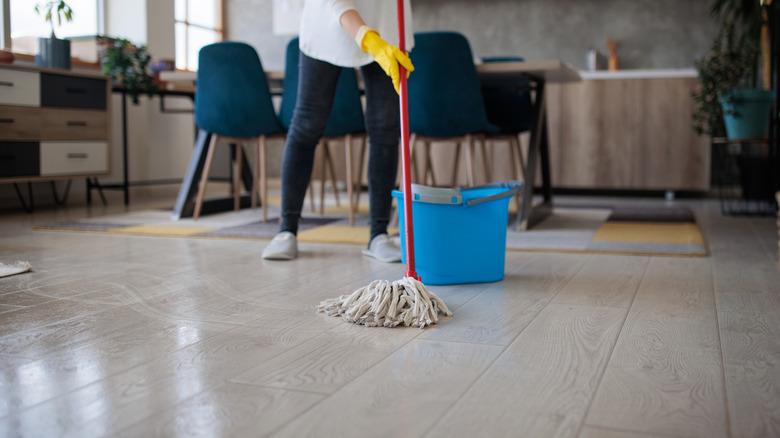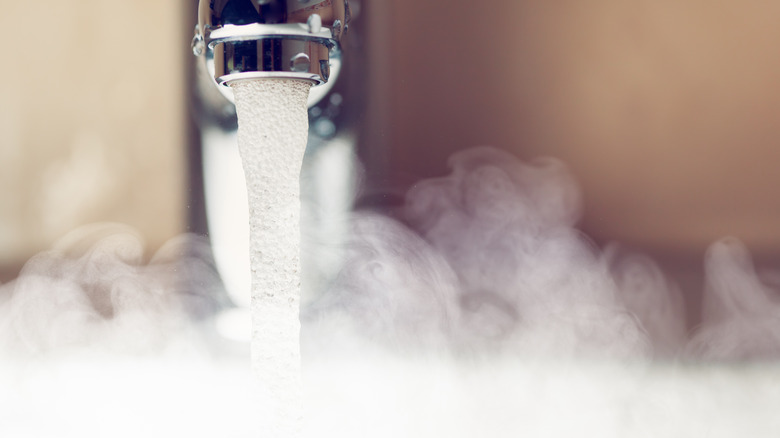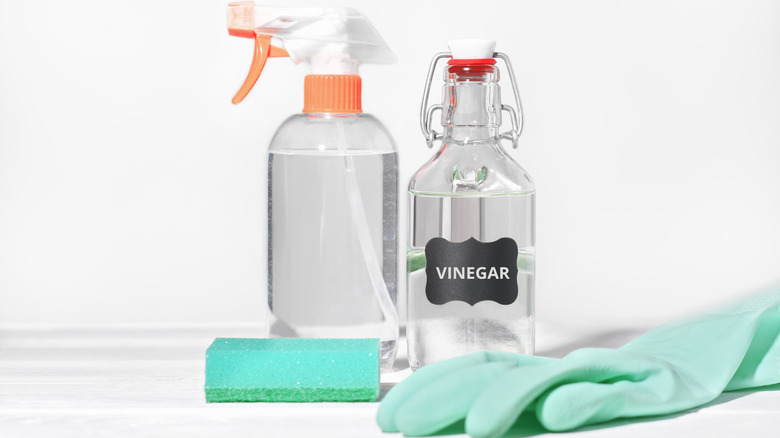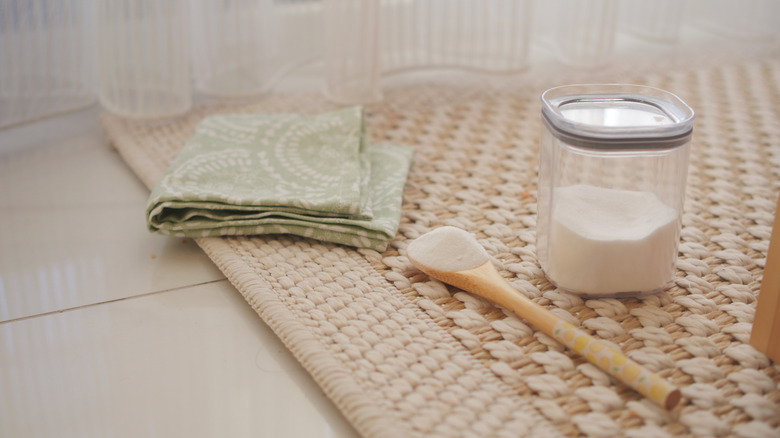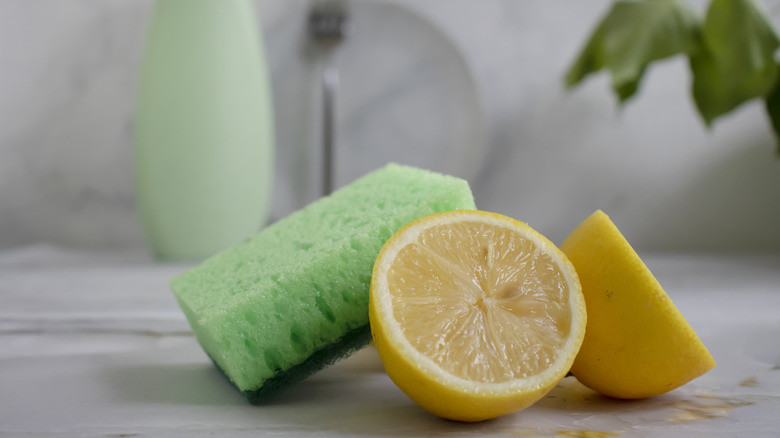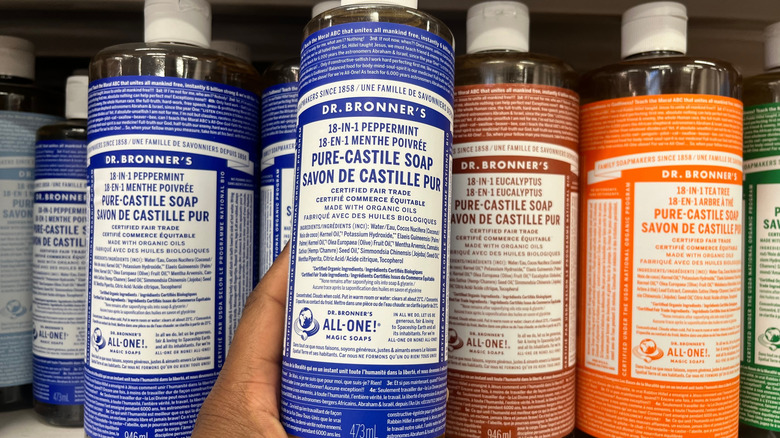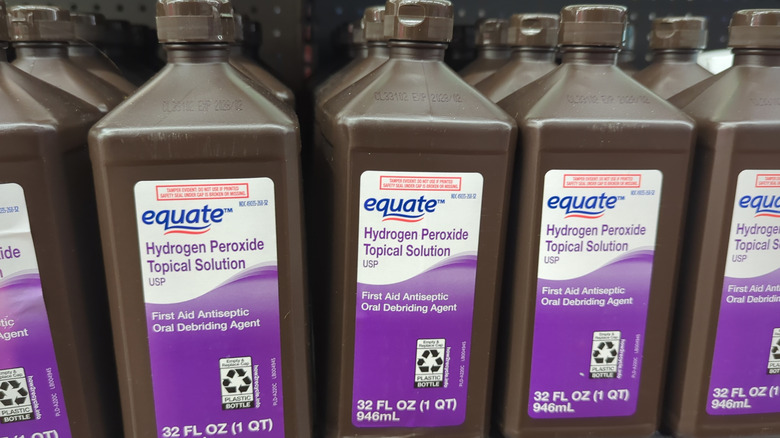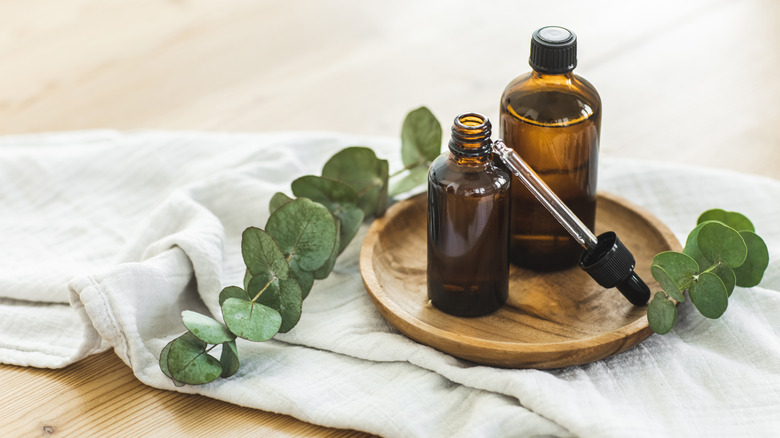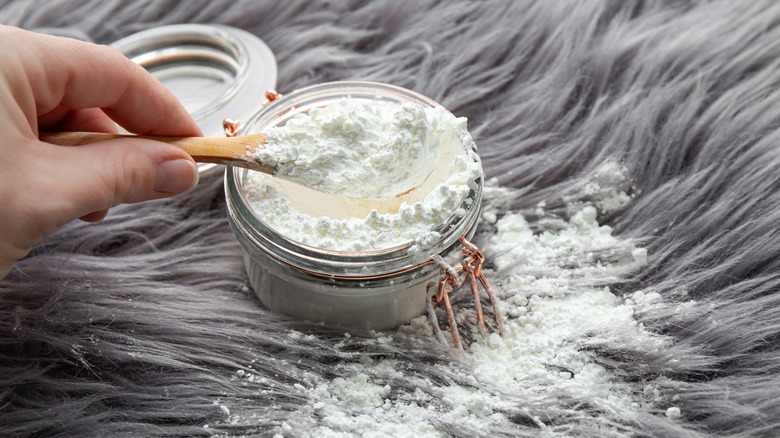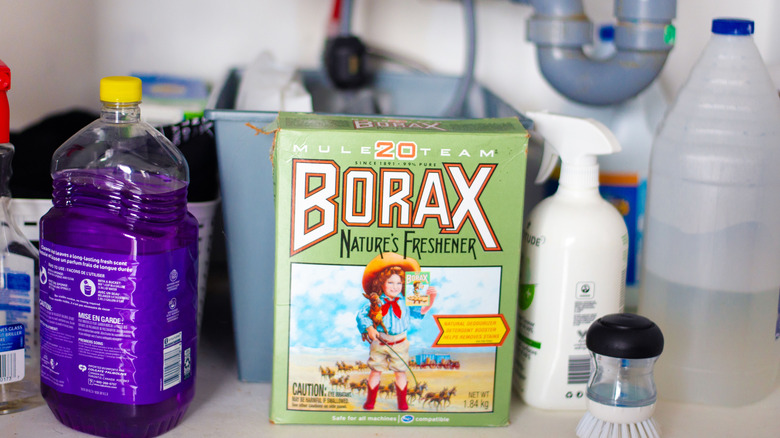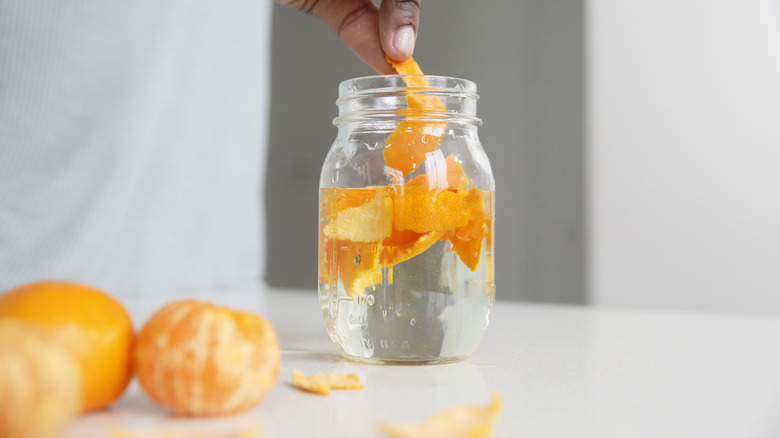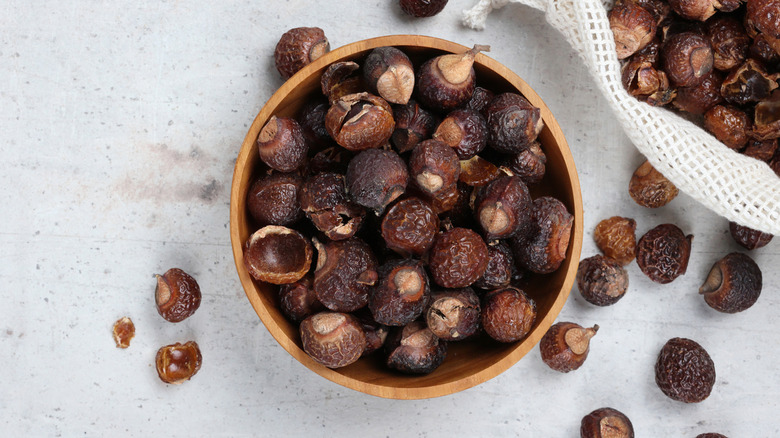11 Natural Ingredients That Are Perfect For Cleaning Your Floors
Natural ingredients have become a popular alternative to harsh chemical-based cleaning products. They're affordable, readily available in most households, and environmentally friendly. Many natural cleaners, like vinegar, baking soda, and lemon, are praised for their ability to cut through grime, remove odors, and disinfect surfaces without leaving behind harmful residues. Beyond sustainability, these ingredients can also make your home safer for children and pets who spend a lot of time on the floor.
But natural cleaners are not universally safe for all floors. The science behind each ingredient matters because every type of flooring, from hardwood and laminate to tile, vinyl, and natural stone, responds differently to cleaning agents. For instance, while vinegar is effective against bacteria and soap scum, its acidity can etch stone or dull hardwood finishes. Baking soda is excellent for lifting stains, yet its abrasiveness may scratch softer surfaces. So, this guide takes a deeper look at the science behind several natural ingredients, explaining how they work and the specific floor types they're best suited for. You'll also find clear instructions and caveats to help you apply each method effectively. Before trying any solution, always test it in an inconspicuous spot to ensure it won't harm your floor's finish.
Hot water is a universal cleaning booster
There are many ways to use hot water to solve common household problems. And on its own, it's one of the simplest and most effective natural cleaning agents. Scientifically, heat makes it easier to break down greasy residues and loosen stubborn dirt particles. This is why hot water is often used as a base when mixing your own cleaning solutions. The cleaning effect of heated water is particularly useful on hard floors that see heavy traffic, such as tile or vinyl.
That said, there are important precautions you should keep in mind. Always use warm, not boiling, water when cleaning floors. A steam mop may seem like a convenient way to clean your floors with hot water. However, this is best for surfaces like sealed tile, as it can weaken adhesives in vinyl flooring, warp hardwood planks, or damage protective finishes.
White vinegar dissolves mineral deposits on sealed tile floors
Beyond its use for dishwashers and washing machines, vinegar can be a versatile cleaning tool since it's one of the best natural ingredients for your floors. Containing 4 to 8% acetic acid, it works by breaking down residues and other grime that can dull your floors. Its natural acidity also makes it a mild deodorizer, helping to neutralize lingering odors while leaving surfaces fresh. For vinyl and tile floors, vinegar can be a safe and effective choice when diluted properly. To use, mix ½ cup of white vinegar with a gallon of warm water.
Avoid using vinegar on waxed floors, as the acidity may strip away protective coatings over time. Similarly, natural stone surfaces like marble, granite, or travertine are among the things in your home you should never clean with vinegar since the acid can cause etching and permanent dullness. While some sources suggest vinegar is safe on hardwood or laminate floors, the American House Cleaners Association (AHCA) advises against it. Wood, bamboo, and laminate surfaces are highly sensitive to extreme pH levels, and vinegar's acidity can weaken finishes and damage adhesives. For these surfaces, it's better to stick with pH-neutral, specially formulated cleaners.
Baking soda removes odors from carpets and other floors
Baking soda, or sodium bicarbonate, is one of the most widely used natural cleaning agents, and for good reason. As a mild alkali, it helps remove residues that can build up on floors. Plus, its fine crystalline texture provides gentle abrasiveness for scrubbing away grime. Compared to more abrasive commercial powders, baking soda is a safer option, making it especially effective for vinyl floors. In addition to its cleaning power, baking soda is well-known for its ability to absorb and neutralize odors, which makes it a go-to solution for refreshing carpets.
There are multiple ways to use baking soda in floor care. For removing scuff marks, simply pour a small amount on a damp cloth, then rub the scuffed area. To deodorize carpets, sprinkle a thin, even layer across the surface, let it sit for 15 to 30 minutes, and then vacuum thoroughly. You should avoid use on delicate finishes, such as unsealed hardwood or natural stone, since even mild abrasives may gradually scratch the surface. Finally, vacuuming large amounts of fine powder, like baking soda, can be harmful because the tiny particles can clog your machine's filters, damage the motor, and reduce suction efficiency. So, make sure you use it sparingly, and clean the vacuum well after emptying it.
Lemon juice helps cut grease and soap scum on ceramic and porcelain floors
Lemon juice is a natural powerhouse for cleaning, thanks to its high citric acid content. The acid helps break down grease and dissolve hard-water deposits, making it a useful natural alternative to harsher chemical cleaners. It's generally safe for tile floors made from ceramic or porcelain, but you should never use it on natural stone floors, as the acid can etch and dull the surface. It also tends to strip away the finishes on sealed hardwood floors.
For practical cleaning, lemon juice can be used alone or combined with other natural agents such as white vinegar or baking soda for targeted stain removal or spot cleaning. This can be done by applying a small amount of lemon juice and baking soda paste directly to stains on tile, letting it sit briefly, and then scrubbing it gently with a brush or sponge. Because lemon juice is acidic, overuse or prolonged contact with delicate finishes can cause dulling or discoloration. So, always do a spot test before using this cleaning hack for your entire floor.
Castile soap lifts dirt from vinyl and laminate
Castile soap is a versatile, plant-based surfactant known for its ability to lift grease, dirt, and grime without the use of harsh chemicals. Its mild yet effective cleaning action makes it an excellent choice for vinyl, laminate, and unwaxed hardwood floors. However, it's important to note that castile soap is alkaline, so you should avoid using it on surfaces that are sensitive to high pH levels, such as natural stone, waxed floors, and certain types of hardwood, which could be etched or dulled by prolonged exposure.
To use, dilute ¼ cup of castile soap in 2 gallons of warm water and mop as usual. Make sure to wring the mop well to avoid over-saturating the floor. After mopping, rinse the area with clean water to remove any soap residue (preventing a dangerous, slippery film from forming) and clean off excess water. Avoid mixing this soap directly with acidic cleaners like vinegar in the same solution, as this can lead to curdling and reduce cleaning effectiveness.
Hydrogen peroxide brightens tile grout and disinfects linoleum
Hydrogen peroxide at a 3 to 5% concentration is a mild oxidizing agent, making it an environmentally friendly alternative to harsher chemical bleaches. Its oxidizing action allows it to brighten surfaces and provide a gentle disinfecting effect, particularly useful for high-traffic areas like kitchens and bathrooms. There are many stubborn household stains you can get rid of with hydrogen peroxide without the risks associated with chlorine-based cleaners, which is a major reason to have this cleaning solution handy. However, it should not be used on unsealed wood, natural stone, or colored grout without caution, as its bleaching properties can cause discoloration or permanent lightening of these surfaces.
To use, apply hydrogen peroxide directly to stained or discolored areas, such as grout lines or tough spots on sealed tile. Let it sit for a few minutes to allow oxidation to take effect, then scrub lightly with a soft brush or sponge if needed. Always rinse the treated area with clean water afterward to prevent residue buildup. Testing in a hidden area first is crucial to ensure your floor's color and finish are not affected. You can use it to mop, but its primary value is in spot treatment and stain removal rather than routine daily cleaning.
Essential oils deodorize and freshen sealed hard floors
Essential oils from plants like tea tree, lavender, and eucalyptus offer natural antimicrobial properties, making them valuable additions to floor cleaning routines. Tea tree oil contains compounds like terpinen-4-ol, which can inhibit the growth of bacteria and mold, and lavender oil also provides antimicrobial activity against a broad range of bacteria. When used on sealed hard floors, these oils can enhance cleaning solutions by reducing microbial load and leaving a fresh fragrance without relying on synthetic chemicals. Plus, cleaning floors is a good way to use old or expired essential oils around the house. Just keep in mind that they need to be diluted and used with care in homes with children and pets. Floors should be completely dry before allowing your four-legged friend to walk on them.
To incorporate essential oils into floor care, add 5 to 10 drops to a gallon of warm water or into a vinegar- or soap-based cleaning solution. Mop as usual, ensuring the mop is wrung out well to avoid over-wetting. For carpeted areas, essential oils can be mixed with baking soda and sprinkled over the surface to deodorize. Allow it to work for about 15 to 30 minutes, then thoroughly vacuum it up.
Cornstarch is a grease absorption solution for carpets
There are many indigenous ways to use corn starch around the house, and one of these is for spot-cleaning carpeted spaces where accidental spills of food or cooking oils occur. Cornstarch is a natural, absorbent powder that effectively lifts grease and oily residues. Its fine particles work by drawing oils away from fibers, helping to prevent staining while reducing odors. It's generally safe for most carpets, but caution is advised for dark-colored fibers and grout, as the powder can leave a visible residue that might be difficult to remove.
To use on carpets, sprinkle a light layer directly onto greasy spots and let it sit for 15 to 30 minutes to absorb oils. Then, gently vacuum or sweep the area to remove the powder. Just like baking soda, vacuuming corn starch can negatively affect your machine, so always use small amounts at a time. For hardwood or other hard floors, cornstarch can also be mixed with water or a small amount of vinegar to create a polishing paste that helps remove minor scuffs or residue.
Borax is a heavy-duty cleaner for linoleum and tile floors
Borax, also known as sodium borate, is a naturally occurring mineral with strong alkaline properties that make it an effective cleaner for tough dirt and grime. Its alkalinity makes it perfect for breaking down residue and grease. It can tackle stubborn stains and deodorize, making it a favorite in high-traffic areas such as kitchens, garages, and utility rooms with linoleum floors or tile.
To use borax safely and effectively, dissolve 2 tablespoons in a bucket of warm mop water. Clean your floors as normal, making sure to rinse thoroughly afterward to remove any residue. If you're cleaning tile floors, combine it with vinegar, dish soap, and water for even more cleaning strength. Borax can irritate skin and mucous membranes, so make sure to wear gloves while you're cleaning. Additionally, it should be stored safely out of reach of children and pets, because ingestion can be harmful.
Citrus peels give floors a fresh scent
Citrus peels, such as those from lemons, oranges, and limes, contain limonene, a naturally occurring compound with mild antibacterial and grease-cutting properties. While commercial cleaning products often utilize limonene extracted through refined methods like steam distillation for concentrated power, soaking peels in vinegar provides a more accessible, low-cost way to leverage some of these benefits. Just don't expect it to match the strength of commercially extracted d-limonene oil. This homemade infusion can be a gentle and eco-friendly addition to your cleaning toolkit, particularly for sealed hard floors like laminate.
To prepare a citrus peel cleaner, submerge the peels in white vinegar, add salt and dishwashing liquid, then strain and dilute the liquid with water before using it to mop your floors. However, avoid using this solution on natural stone since the vinegar could etch it. This solution should be used as a supplementary cleaning solution, best for light cleaning or as a deodorizing rinse.
Soap nuts are plant-based surfactants for gentle floor cleaning
Soap nuts, also known as soapberries, are the dried fruit shells of the Sapindus tree. They contain saponins, which act as natural surfactants, compounds that lower the surface tension of water and help lift grease, dirt, and grime. When soaked in water, the saponins are released, creating a mild soapy solution that can be used on sealed hard floors. Because the cleaning action is gentle, soap nuts are especially valued for households looking to minimize synthetic chemicals while still maintaining clean and safe living spaces. They are great for most floors, but you have to use them with caution on natural stone like marble because of how delicate these floors are.
To make a floor-cleaning solution, place 10 to 15 soap nuts in boiling water and simmer them for about 45 minutes to an hour. Strain out the shells, lather the water, and you'll find that you have a foamy solution for mopping. Dip a microfiber mop in the solution and wring it well before using it to clean. Ensure the water is not too hot, as this could damage your floor. Note that this natural solution may not provide enough strength for heavily soiled floors or stubborn stains.
